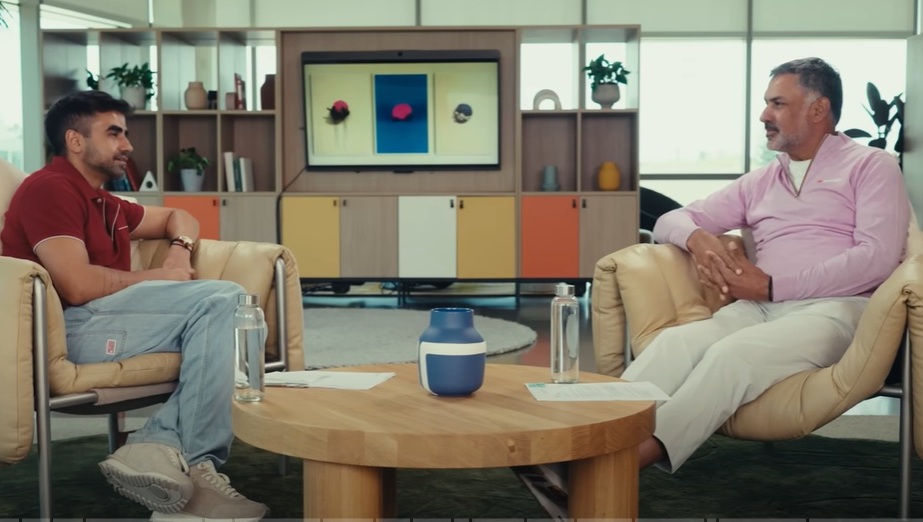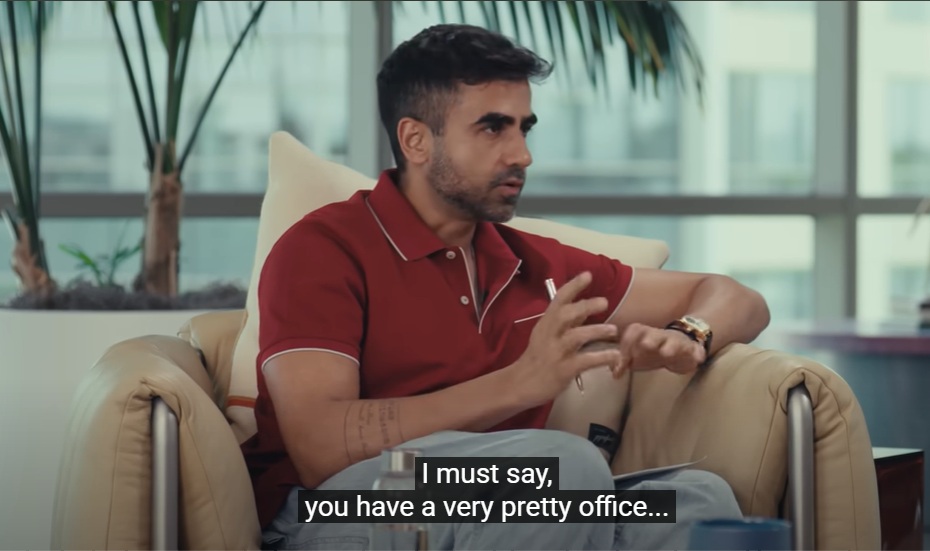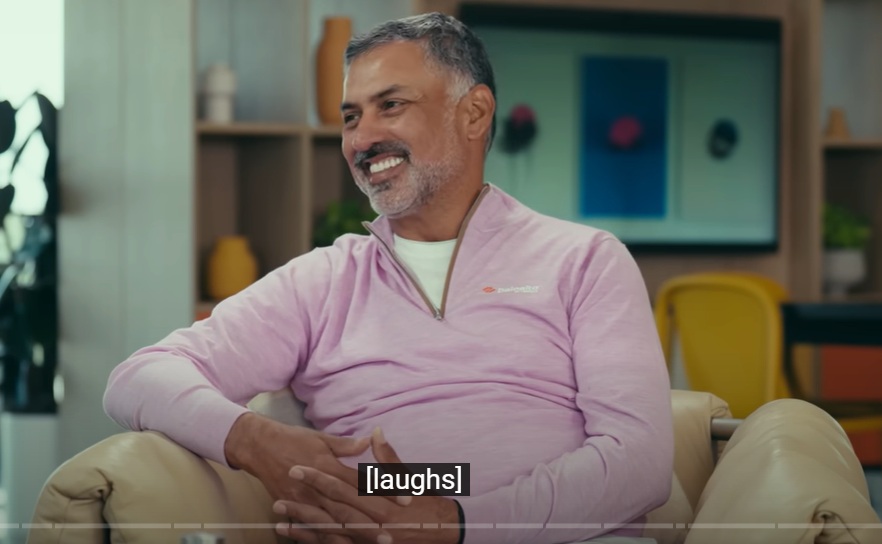Nikhil Kamath Hosts Nikesh Arora on People by WTF to Explore the Future of AI, Cybersecurity, and Leadership; Should India Make Its Own AI Model?

FinTech BizNews Service
Mumbai, June 30, 2025: In the latest episode of People by WTF, investor and entrepreneur Nikhil Kamath sits down with Nikesh Arora, CEO and Chairman of Palo Alto Networks, for an unfiltered conversation on the future of cybersecurity, artificial intelligence, lessons learned under Larry Page and Masayoshi Son, quantum computing, and what it takes to lead in a world moving 10X faster.

Investor and entrepreneur Nikhil Kamath
Spanning personal stories, bold predictions, and strategic insight, the episode is essential listening for entrepreneurs, tech leaders, policymakers, and investors alike. Highlights include:
1. Growing up, rejection letters and boardrooms: Nikhil Kamath opens the conversation by asking Nikesh Arora to start “where it matters most,” sparking a candid look at childhood, rejection, and resilience. Arora credits a “blessed” upbringing to his father’s unwavering integrity, his mother’s academic focus, and constant Air Force relocations that taught him to adapt quickly and says, “When you’ve packed up and moved all your life, change feels natural.” Nikesh shares his academic and early career journey, one shaped as much by detours as by degrees. With a resume spanning
IIT-BHU, Boston College, and Northeastern, he jokes, “I wasn’t smart enough,” recalling how he left the CAT exam midway to catch a movie. The real turning point came during the 1992 recession: “I wrote 400 plus letters to people applying for a job... sometimes a printer ran out of ink, but I knew it was a rejection letter.” He still keeps every one of those 400 rejections. Despite being voted “most likely to end up on Wall Street,” banks passed him over, until Fidelity gave him a shot. “I had seven rejection letters from Fidelity before I got a job for the eighth person. So thank God they weren’t comparing notes.”

Nikesh Arora, CEO and Chairman of Palo Alto Networks
2. Hacktivists to Heists: The Cyber Shift: Nikesh Arora traces the evolution of cyber threats, highlighting how hacktivism has morphed into a global criminal economy driven by prestige and profit. “There is a general belief that most security companies and now infrastructure software companies are constantly attacked,” he notes. With attacks often paid in untraceable cryptocurrency, “hacking has become the Wild West.” As over $10 billion is extorted annually, cybercrime now rivals global conflict. Citing the Russia-Ukraine war, Arora warns: “We think most future wars are part cyber wars and part technology wars.” Cybersecurity, he emphasizes, is no longer just about protecting IT, it’s a frontline of national and global defense.
3. Agentic AI and the New Cyber Frontiers: Nikhil explores how investors and entrepreneurs can spot the next big cybersecurity bets, asking, “How does one evaluate exposure to cybersecurity, what should we be looking for?” Nikesh points to emerging “attack vectors” as high-opportunity zones and shares, “The most likely categories which will see outsized returns are categories where a new attack vector is being born.” One such vector is agentic AI, autonomous systems acting on our behalf, which Nikesh says introduces massive risk. “If you trust AI to do all of that for you and show up blindly, that would be called giving agency to that agent. I don’t think we’re ready as human beings to let even that basic agency.” He warns, “Those agents will allow you to act on behalf of whoever’s agent you’ve taken over,” creating a new class of threats.
4. Zerodha and the Agentic AI Shift: Nikhil Kamath questions whether platforms like Zerodha, built on trust, regulation, and user interface, can remain dominant as agentic AI begins to reshape software interaction. “Can systems of record persist only because they’re regulated, or will decentralized models driven by trust take over?”. Nikesh Arora agrees that such platforms function as foundational infrastructure. “A system of record is almost like something that is built over time. Either its mandated by regulation, mandated by enterprises. If a payroll system goes away tomorrow, you wouldn't know how much you paid someone and how much you have to pay them.” He adds, “It’s too painful for you to replace that system of record.” But he cautions that survival will depend on evolution, mentioning, “There is a prevailing theory that the big will become bigger. If they are smart enough and fast enough and agile enough to be able to change the mode of interaction with the system of record.”
5. Democratized AI vs. Decades of Brand Trust: Nikhil Kamath poses a question: If AI democratizes intelligence, will brand loyalty still matter? “So if AI becomes democratic, how big does the role of a brand play in something like this? Is it just utilitarian or is there a brand play involved?” Nikesh Arora affirms the enduring power of brand, arguing it’s built on more than data. “Brands are correlated experiences and trust and perception... the brand encompasses a lot more than the raw material from that person. I don't know how democratization of AI changes that.” While AI may erode information asymmetry, “Historically, a lot of power has been because of an information disadvantage or asymmetry”, he believes the future advantage lies in proprietary data and solving unknown problems. “The domain-specific, capital-intensive AI is going to be the future... and it’s going to evolve 1,000x faster than anything we’ve seen before.”
6. AI Isn’t the End, It’s the Beginning of What’s Next: Nikhil invites Nikesh to imagine what the world might look like a decade from now, probing for a vision shaped by AI and technological shifts. Nikesh resists crystal-ball predictions, instead offering a grounded perspective on uncertainty and adaptability. He reflects on how past crises, like the pandemic, brought fears of collapse, yet humanity adapted and moved on. “I don't see anybody digging up the ground to plant wheat. Things have happened and we all found something else to do.” Rather than fearing what lies ahead,
Nikesh believes in embracing progress. He emphasizes that as old problems are solved, new avenues of innovation and opportunity will emerge. “I m sure we'll find ways to propel society further and I am sure things that get solved easily will create new opportunities.” His message is clear: stay optimistic, stay agile.
7. Nikesh’s Playbook for Future Founders: Nikhil asks Nikesh what advice he would offer to young founders starting out today, whether or not they’re in cybersecurity. Nikesh responds candidly, acknowledging a role reversal: he now finds himself learning from the younger generation. He highlights that startups today are moving faster than ever, building AI-powered products in record time and reaching massive scale with lean teams. “The wave of technology that is coming is going to allow people to build businesses faster, more agility, a lower number of people and fundamentally rethink them.” He stresses the importance of ambition and bold thinking. In an era of exponential change, incremental improvements won't cut it. “If your rethink is marginal, if you're looking for a 10, 20% improvement, don't bother because things are about to move 10X... If your idea is not 10X worthy, you're solving the wrong problem.”
8. Should India Build Its Own AI Model?: Nikhil poses a critical question: should India build its own foundational AI model, especially in a world where geopolitics increasingly shape access to technology? Nikesh agrees in principle but outlines major hurdles. “We should. The question then becomes, is a CapEx question?” He highlights that India has historically avoided large, high-risk capital projects, building a frontier AI model could cost tens of billions, and there’s limited appetite for that scale of investment. “You can't walk around and raise $50 billion and build two nuclear plants to fund AGI today, irrespective of who you are and irrespective of who your investors are from the Indian subcontinent.”
While open-source models are an option, Nikhil adds a geopolitical lens: “In a world which is getting increasingly fragmented... if somebody turns off a tap that we have built so much upon, what happens then?” To this, Nikesh offers cautious optimism. India’s large, tech-savvy population makes it a crucial market for global AI players. “There will always be the possibility of collaborating with a model somewhere in the world, with 1.8 billion people, that it'd be silly to ignore that market.” While building a sovereign model may not be immediately feasible, Nikesh affirms its strategic importance: “The unequivocal answer is, yes, we should in India.” The real challenge lies in aligning capital, talent, and infrastructure to make it happen.
9. AI Gold Rush or Bubble?: Nikhil asks, “If you invested a dollar in every AI company today, would it pay off in a decade, or is it all overhyped?” Nikesh breaks it down. In the short term, success depends on execution, and many AI startups are burning cash and banking on sky-high valuations. “Clearly there is a gold rush,” he notes. But long term, he’s bullish: AI can drive massive efficiency, reduce costs, and democratize intelligence. Still, he cautions, it’s uncertain which companies will last. The opportunity is real—but so is the noise.
10. India, Failure, and Culture: What We Can Learn from Israel: Nikhil asks what holds back India’s innovation potential despite its talent. He reflects on how, despite the talent, India still struggles to scale breakthrough ideas, especially compared to startup ecosystems like the U.S. or Israel. Nikesh shares, “I think it boils down to a combination of things.
It's part talent and resources. It's part infrastructure, it's part availability, all of that is part ease of doing business.” He emphasizes one key missing ingredient: cultural acceptance of failure. “I think it's also partly the acceptance of failure.
Failure is not as easily accepted anywhere in the world, but in Silicon Valley, the market gives them the benefit of doubt and funds them again and again.” He contrasts this with Israel and shares, “Israel, they feel very lucky if they build a billion dollar company... So there's a lot of cultural stuff in there. There's a lot of cultural acceptance of failure, cultural sort of role modeling.” He notes that over half the 20+ startups he acquired in the last seven years came from Israel.
*DISCLAIMER: This conversation was recorded prior to the current conflict involving Israel and Iran.
11. Founders vs. Builders: What Personality Wins in Tech? Nikhil explores the difference between founders and non-founder tech leaders, asking what personality fits each path. He asks, “How do you think those journeys are different and what kind of personality type is suited for which?” Nikesh reflects on his own journey, straddling tech and business from IIT to Putnam and says founders often have a “moral right” to build long-term visions. He further adds, vision alone isn’t enough, “A product-only company is not a company, it needs a business around it.” He stresses that leadership is less about individual brilliance and more about assembling the right team. “Part of winning means surrounding yourself with the right intermix of people.” Nikesh credits his success to pairing with strong technical partners and bringing in risk appetite. When asked if hiring defines a leader, he agrees, but adds, “Hiring is just the beginning. You have to keep your eye on the North Star, it tends to move sometimes.”
12. Lessons from Larry Page and Masayoshi Son: Nikhil asks Nikesh to share what he learned from working closely with Larry Page and Masayoshi Son. Nikesh begins by challenging the idea of idolizing role models entirely. “I believe in the concept of admiring people for something that they're really good at. I look for traits in different people and try to learn from them.”, he shares. Nikesh shares that from Larry Page, he learned the power of product obsession. In their first one-on-one, Larry said, “I’m sure if I had a few hours, I could help you do your job 20% better. Let me know when you have two hours.” The point stuck, and Nikesh highlights that “Companies that lose sight of product eventually fail.”
From Masa Son, it was about unlearning fear. While Indian culture teaches risk aversion, Masa was the opposite -relentlessly bold, endlessly curious, and all-in every day. “Every entrepreneur was trying to take risks to build a stable business. Masa kept taking bigger risks even after getting rich. He was the richest man in the world for a few days, and then he was almost bankrupt. So you learn that risk appetite is actually something we govern, but it is significantly influenced culturally.”
Catch the full episode of People by WTF&; featuring Nikesh Arora on YouTube here: From Ghaziabad to Silicon Valley:
Nikhil Kamath x Nikesh Arora | People by WTF | Ep. 11